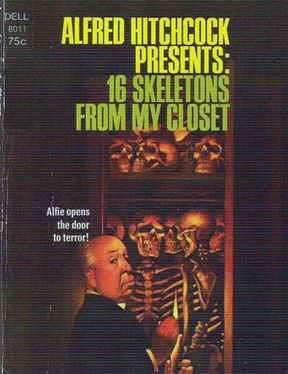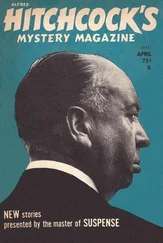Helen had warned her, of course, about Paul Carter. Paul was the latest of many young men in Marcia's life. Helen had warned her sister about most of them, but Marcia would never listen. Never listening was another method that Marcia employed to run away from the realities of existence. Paul was a nice enough young man in his weak-chinned way, Helen supposed. He was pleasant of manner, vacuously good-looking, well-dressed, financially secure. But he was married and he was the father of two children. What was worse, he was married to the daughter of Mr. Enright, who owned the firm where Marcia had been employed as a secretary. As Paul Carter's secretary, in fact. Paul's father-in-law had made him vice-president of the Enright Advertising Agency.
Helen felt sure that the affair had been none of Paul's doing. Marcia had probably thrown herself at young Carter. When Marcia had quit her job, a well-paying job, because her relations with Paul had become too noticeable, she had been sure that Carter would divorce his wife, sacrifice his career and marry her. Of course, that hadn't worked out any more than Marcia's other fantasies had. Tonight Paul had come to the apartment to tell Marcia he couldn't see her any more, that stories had got back to his wife and his father-in-law. It must have required an unusual amount of courage on his part to do that. Paul, like Marcia, had a way of running away from issues instead of facing them.
Helen shivered and hugged the dressing robe tight around her slim body as she thought of the horrible scene that had ensued. She had been working on an illustration for a fashion magazine in her bedroom, which also served as her studio. Through the closed door, she had heard Marcia screaming hysterical imprecations at Paul. She had thought of the living room window that opened on an areaway, the possibility of the neighbors hearing what was going on, and had rushed to close it. That was when Marcia had smashed the vase over Paul's head. It was a heavy vase, but the blow was so hard that it had been broken into a dozen pieces. The fragments of pottery still made an unsightly litter on the floor. Paul had slumped from his chair and had lain there on the floor, terribly motionless, his face drained of color, blood seeping slowly and insidiously from the cut on his head. For an awful moment, Helen had thought he was dead. Of course, Marcia had run away, had run to her own bedroom and locked the door. Helen had bathed and dressed Paul's wound and then he left the apartment, still very unsteady on his feet. Helen glanced at the clock. That was more than half an hour ago, she thought. I hope he's all right. I hope he had sense enough to find a doctor. I hope he has some believable explanation for his split scalp when he gets home.
Helen noticed that the living room window was still open, that the shade had not been lowered. The thing had happened with such sickening suddenness, that she had forgotten her reason for having come into the living room. Oh well, she thought, the apartment across the areaway is dark. The apartment was usually dark. It was occupied by a grossly fat old man who apparently lived alone. Helen had encountered him in the hall a time or two.
It was a large apartment for an old man to live in alone, Helen thought, trying consciously to keep her mind from the violent incident that had just occurred. The layout, she knew, was the same as that of the flat she and Marcia occupied. The building was a huge old graystone New York apartment house, off upper Broadway, once a good neighborhood that was going into dry rot from neglect. The streets were filled with brown-faced youths who wore leather jackets. Their eyes were hard beyond their years. Helen was frightened by them. She did not like coming home alone, late at night. She was frightened for Marcia, too. Marcia often stayed out very late. But their apartment was large and the rent was reasonable. There were two bedrooms. When Marcia had come to New York she had demanded a bedroom of her own, saying she was nervous and slept poorly at best. Helen's own bedroom had a north light and was therefore also able to serve as a studio. Helen made her living as an illustrator, for fashion magazines, and she worked at home.
Helen glanced at the clock again. It was after midnight now. I must go to bed, she thought, even if I can't sleep. She began to switch off lamps in the living room. She caught a glimpse of herself in a wall mirror. She thought she could see the beginning of little crow's tracks around her eyes and mouth. I'm twenty-eight, she thought. That makes me a spinster, I guess. She had devoted the best of her youth to taking care of her younger sister.
She was about to turn off the last of the lamps, when there was a sudden, loud knocking at the door to the apartment.
She stood frozen for a moment, paralyzed with fear. It's the police, she thought. Paul must have collapsed from loss of blood and somehow they've found out what happened here.
There was a little peephole in the door, covered by a hinged metal lid. Helen raised the little lid. The fat old man who lived in the front apartment was standing at the door, thudding down repeatedly with the small brass knocker.
Helen said through the small peephole, "Please stop that knocking! My sister's asleep. What is it?"
It was the first time she had ever heard the old man speak. His voice was deep and unctuous, though he made an attempt to keep it low.
"Open up, my dear," he said. "It's most important. A matter of life and death, in fact. I can't speak through this little hole."
Helen hesitated. Finally she opened the door, attempting to block the entrance with her body, but the bulk of the old man pushed her aside and he walked into the room.
"Really!" Helen exclaimed. "Please tell me what this is all about. It's after midnight!"
"I apologize for the intrusion, my dear," the old man said calmly. "Allow me to introduce myself. My name is Heavenridge. George M. Heavenridge. Past seventy, retired, and quite harmless, I assure you, my child. And there you have my history. Now, as to my business." His thick lips smiled at Helen. The room was filled with the odor of his unclean clothes and of stale cigar smoke. He rubbed his gray-stubbed chin, the flabby jowls, with a pudgy hand. The fingers were brown with nicotine and tipped by black half-moons.
"What business?" Helen asked, realizing her voice was far too shrill.
The old man seated himself, without an invitation.
"It's about the room, my dear," he said. "The room you advertised for rent in the evening paper."
Helen regarded the old man in blank astonishment, for a moment. Then she said, "I advertised no room for rent! There's some mistake. Even if I had, this is an odd time of night to inquire about it."
The old man waggled a stained and stubby finger at Helen. His thick, moist lips smiled over dentures that were ghastly white.
"Ah, yes, my dear. You advertised a room for rent. We'll agree on that, I think. And we'll agree at once that I become your boarder. Immediately. Tonight, you understand? I live in the front apartment. I will bring only the things I need tonight. Tomorrow and in the days to come I can move in my other possessions. I have the right to sublease my own flat. There's no hurry. I'll wait to find a proper tenant who will pay a proper price. But your own need is great. Yours and your sister's. You must have my protection immediately. That is vital, my dear. We'll agree on that, too."
Helen regarded the smiling old man, dumbfounded. She shook her head slowly.
"This is quite mad!" she said. "Why on earth should my sister and I require your 'protection,' as you call it?"
The fat old man was still smiling as he said, "Because they found the body, my dear. The police, I mean. They found the body just outside the house a little while ago. Such a young man. So tragic to be struck down in the prime of life."
Читать дальше









